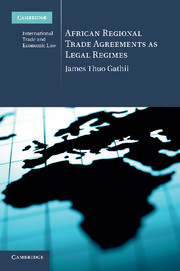Book contents
- Frontmatter
- Contents
- Figures
- Tables
- Acknowledgements
- Abbreviations
- Table of cases
- Introduction
- I African Regional Trade Agreements as Flexible Legal Regimes
- II Variable geometry: A defining aspect of African RTAs
- III Multiple memberships in African RTAs
- IV African RTAs in the context of Article XXIV of the GATT
- V Trade liberalization commitments and realization time frames
- VI Financing African RTAs
- VII African RTA Judiciaries
- VIII Trade remedy regimes
- IX Monetary unions in Africa
- X Intra-African regional trade integration
- XI African RTA relations with non-African RTAs
- Bibliography
- Index
- References
III - Multiple memberships in African RTAs
Published online by Cambridge University Press: 05 July 2011
- Frontmatter
- Contents
- Figures
- Tables
- Acknowledgements
- Abbreviations
- Table of cases
- Introduction
- I African Regional Trade Agreements as Flexible Legal Regimes
- II Variable geometry: A defining aspect of African RTAs
- III Multiple memberships in African RTAs
- IV African RTAs in the context of Article XXIV of the GATT
- V Trade liberalization commitments and realization time frames
- VI Financing African RTAs
- VII African RTA Judiciaries
- VIII Trade remedy regimes
- IX Monetary unions in Africa
- X Intra-African regional trade integration
- XI African RTA relations with non-African RTAs
- Bibliography
- Index
- References
Summary
Introduction
This chapter will examine another important feature of the flexibility of African RTAs – multiple memberships. Of the fifty-one countries in Africa, only six belong to a single RTA. The other forty-five belong to at least two or more RTAs. Swaziland belongs to three RTAs – COMESA, SADC and SACU. Of all five countries in the EAC, four are also members of COMESA, while Tanzania is a member of SADC. Of the fifteen countries in SADC, eight are also members of COMESA. Figures 3.1 to 3.4 illustrate the prominence of multiple memberships in African RTAs.
- Type
- Chapter
- Information
- African Regional Trade Agreements as Legal Regimes , pp. 65 - 85Publisher: Cambridge University PressPrint publication year: 2011



